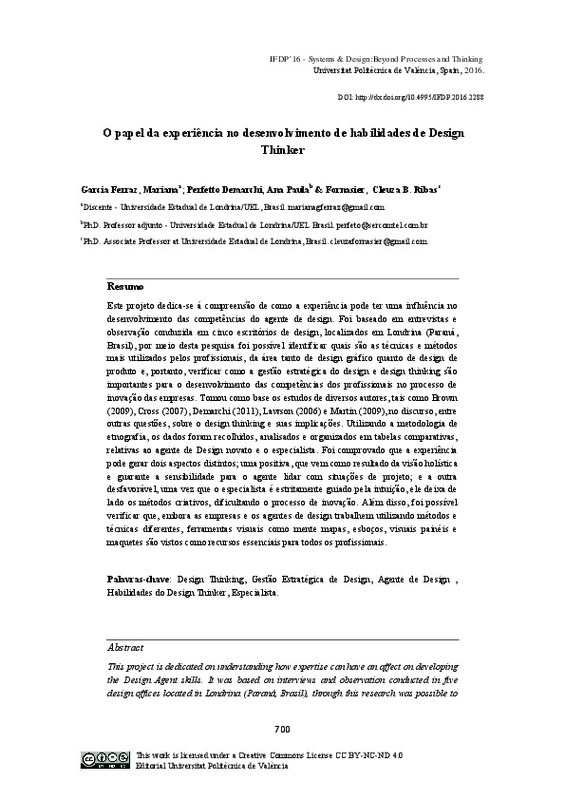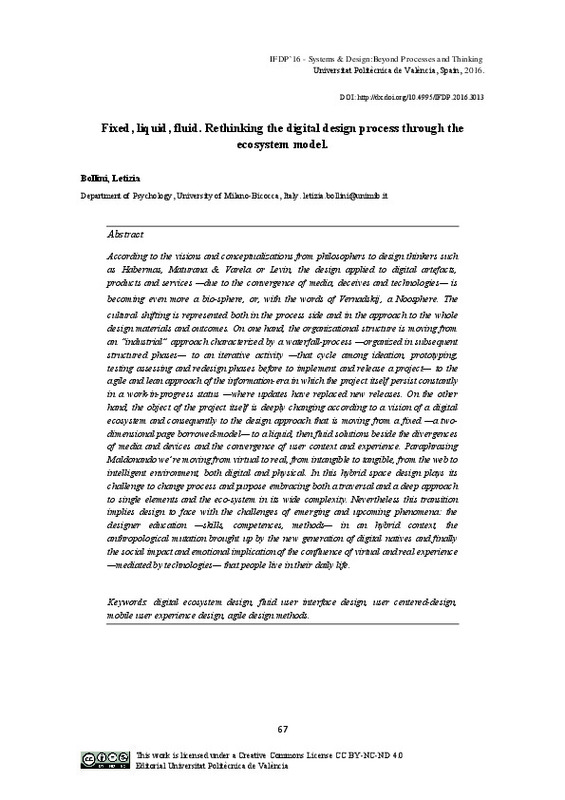JavaScript is disabled for your browser. Some features of this site may not work without it.
Buscar en RiuNet
Listar
Mi cuenta
Estadísticas
Ayuda RiuNet
Admin. UPV
(ED)2 Emotion-Driven Experience Design: A Method to Design Tourist Experiences Starting from Emotions
Mostrar el registro sencillo del ítem
Ficheros en el ítem
| dc.contributor.author | Jacob-Dazarola, Ruben
|
es_ES |
| dc.contributor.author | Martínez Torán, Manuel
|
es_ES |
| dc.contributor.author | Mollenhauer Gajardo, Katherine
|
es_ES |
| dc.date.accessioned | 2024-12-17T19:02:25Z | |
| dc.date.available | 2024-12-17T19:02:25Z | |
| dc.date.issued | 2024-01-15 | es_ES |
| dc.identifier.issn | 2325-128X | es_ES |
| dc.identifier.uri | http://hdl.handle.net/10251/213006 | |
| dc.description.abstract | [EN] This article presents, first, the synthesis of a theoretical and methodological framework that has creation and development of a toolkit whose objective is to serve as a central method or support led to the in the tasks of co-design, categorization, evaluation, or validation of different tourism experiences from the perspective of emotional design, finally carrying out a preliminary evaluation of their usefulness, relevance, and perception. The proposal arises from the methods of design and creation based on cards (Issue Cards) that in a phase of exploratory design or early prototyping make it possible to broaden the opportunities and points of view regarding the analyzed problems and from the emotional perspective. In this way, they make it possible to evaluate the experiences of these services more effectively by using them as facilitators of team dynamics or creative workshops. The toolkit developed was structured in a scheme of twenty-seven cards that have as central elements the basic emotions: love, happiness, anger, fear, and sadness according to what has been proposed by previous studies in this field. This set of cards and the associated documentation and instruments has been called emotion-driven experience design or (ED2) (e-d squared), and this document presents its development and the first results obtained in its application. | es_ES |
| dc.language | Inglés | es_ES |
| dc.publisher | Common Ground Research Networks | es_ES |
| dc.relation.ispartof | The International Journal of Design Education | es_ES |
| dc.rights | Reconocimiento (by) | es_ES |
| dc.subject | Design | es_ES |
| dc.subject | Emotions | es_ES |
| dc.subject | Design methods | es_ES |
| dc.subject | Services design | es_ES |
| dc.subject | Tourism | es_ES |
| dc.subject | Experiences | es_ES |
| dc.subject | Cards | es_ES |
| dc.subject.classification | DIBUJO | es_ES |
| dc.title | (ED)2 Emotion-Driven Experience Design: A Method to Design Tourist Experiences Starting from Emotions | es_ES |
| dc.type | Artículo | es_ES |
| dc.identifier.doi | 10.18848/2325-128X/CGP/v18i01/57-81 | es_ES |
| dc.rights.accessRights | Abierto | es_ES |
| dc.description.bibliographicCitation | Jacob-Dazarola, R.; Martínez Torán, M.; Mollenhauer Gajardo, K. (2024). (ED)2 Emotion-Driven Experience Design: A Method to Design Tourist Experiences Starting from Emotions. The International Journal of Design Education. 18(1):57-81. https://doi.org/10.18848/2325-128X/CGP/v18i01/57-81 | es_ES |
| dc.description.accrualMethod | S | es_ES |
| dc.relation.publisherversion | https://doi.org/10.18848/2325-128X/CGP/v18i01/57-81 | es_ES |
| dc.description.upvformatpinicio | 57 | es_ES |
| dc.description.upvformatpfin | 81 | es_ES |
| dc.type.version | info:eu-repo/semantics/publishedVersion | es_ES |
| dc.description.volume | 18 | es_ES |
| dc.description.issue | 1 | es_ES |
| dc.relation.pasarela | S\509554 | es_ES |







![[Cerrado]](/themes/UPV/images/candado.png)



